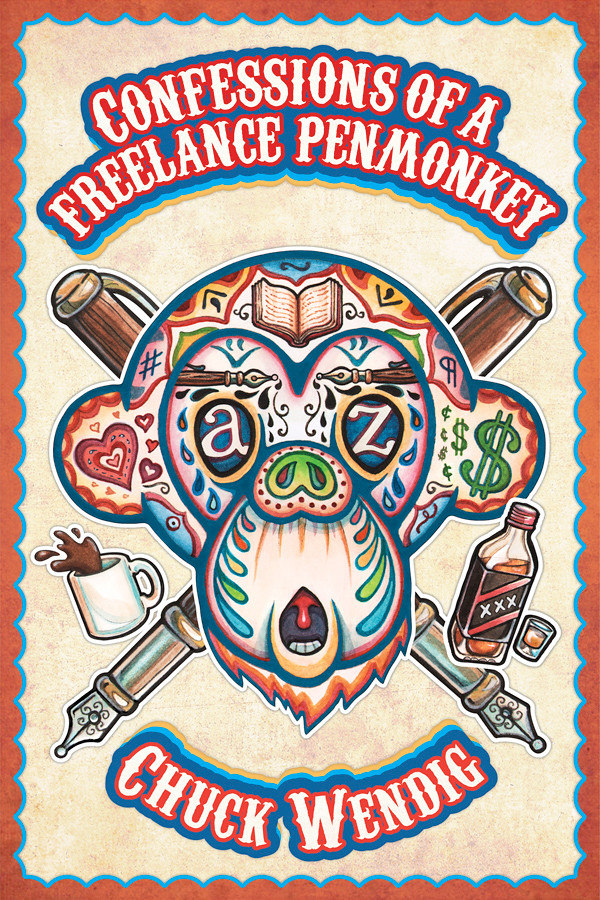I love the title of the book, and let’s face it, the cover art is incredible and it alone would be enough for me to pick this book off of the shelf and take a serious look at it.
I think this line from Chuck Wendig’s book, Confessions of a Freelance Penmonkey sums it up best:
“I’ve said it before and I’ll say it again: at terribleminds, http://terribleminds.com/ I aim first to be educational. When that fails, I aim to be funny. And when that fails, I am to dazzle and confuse with creative profanity.”
And he is wildly successful at all three objectives. Not only does he provide excellent writing advice, but the biting, often profane, turns of phrase are laugh out loud funny. Although I don’t understand his obsession with giraffe porn, his penchant for using the word syphilitic, and going pants-free (although the multiple references to wombats in his pants might explain this), but Wendig takes the metaphors to extreme, yet memorable levels.
I spend a lot of time trying to tame the seething profanity beast within me, but Wendig encourages me to embrace it. But I do have kids, who already call me out on my frequent “slips”, so it is probably best to cultivate this depravity in the dank recesses of my writing mind.
His in-your-face approach might be offensive to some, but realistically, if you are a serious writer, you have to appreciate the tough-love, scared-straight, edgy advice he rapid fires straight out of his keyboard. Here are a couple examples, here are the names of two sections in the chapter titled “Why You Probably Still Suck as a Writer”: “Your Writing Is Like That Mumbling Hobo On The Midnight Bus” and “You Think Every Draft is a No-Net Slam Dunk When Really it Rebounds Off the Backboard and Flies Into the Crowd and Hits a Lady in the Face, Driving Her Nose Into Her Brain and Then She Dies but You Don’t Notice.”
His suggestions for gathering writing material (writing what you know) are excellent and his approach and advice about work habits is also excellent:
“Don’t make excuses. Nobody wants to hear excuses. Writing is a results-driven career: what you’ve done is who you are.”
But some of the best advice he provides is specific to fiction writers and how they have a bond with the reader that is tenuous and easily broken.
“Write what you know, but make sure you recognize that you know a lot more stuff than you think you know and in the struggle between fact and fiction, what matters is authenticity instead of hard data…”
In his chapter titled, “Escalation, Escalation, Escalation: The Three Most Important Words in Plotting”, he stresses the importance of creating conflict and sustaining dramatic tension:
“Understanding escalation gives you a powerful tool in composing a strong plot and driving story; it’s the thing that brings people back to the book, it’s the thing that glues them to the screen, that stops them from changing channels, that keeps them playing the game well past the point of reasonable time management…”
Do yourself a favor and download a copy of Confessions of a Freelance Penmonkey today. And don’t forget to checkout his blog: www.terribleminds.com for more in-your-face writing advice with a healthy side-dish of creative profanity (as well as other opportunities to purchase this book and many others).
I’ll also be posting some other quotes from the book via my Twitter feed over the next couple of weeks, if you’d like to follow me… but better yet, follow Chuck instead.
Rating ****
About Ratings: ***** — Well Worth it at Full Retail Price; **** — Buy on Sale/Discounted; *** — Buy Used; ** — Borrow It from the Library; * — Waste of a Good Tree